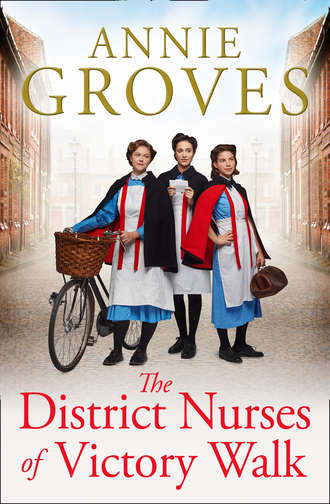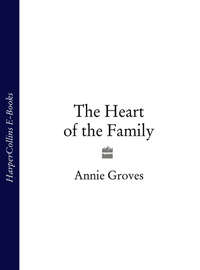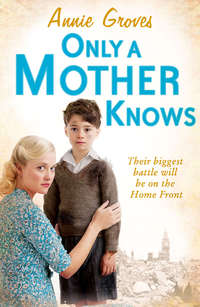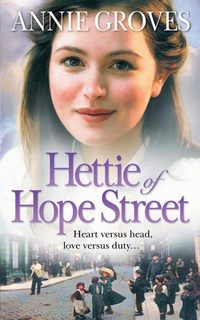
Полная версия
The District Nurses of Victory Walk
‘Me?’ Alice was taken aback. ‘What would I have to do? I’m not sure … I mean, I know how to clean my teeth, but I’m not an expert or anything …’
‘No, no, I’m not expecting you to be,’ Fiona said reassuringly. ‘We don’t want a stranger scaring the little ones. We want someone who is good with children and I’ve noticed that you are. Word gets around, you see. So, what they’d like you to do is go into the school and show the children how to do it, maybe one class at a time, so that you can keep a good eye on how well they’re doing. They’ll bring in their own toothbrushes – or the school might see to it quietly that they all have one. I’m going to approach a local wholesaler to ask if they can let us have toothpaste or toothpowder cheaply or even for free, as a goodwill gesture. Some families make their own toothpowder, but you can’t guarantee what’s in it half the time.’
‘I see,’ said Alice, shuddering inwardly, and realising yet again how lucky she’d been in her upbringing in this small but vital matter – always having a new toothbrush and constant supplies of proper toothpaste.
‘Excellent,’ said Fiona briskly. ‘Well, no time like the present. They’re expecting you this afternoon.’
‘This afternoon?’ Alice echoed in surprise.
‘Yes indeed. Leave it much longer and the children will be on their school holidays. We need to get good habits well ingrained before that. Of course the toothpaste won’t have arrived from the company, but you can demonstrate what to do so they know in advance.’
‘Oh,’ said Alice, because she couldn’t think of anything else to say. Really, there wasn’t much to say when you were swept up in Fiona’s efficient whirlwind.
‘That gives you a couple of hours to think about what you’ll say and to cycle over there. Ask for Miss Phipps. Best take your own brush with you, so you can show them exactly what you mean.’ Fiona beamed. ‘And you can tell me all about it later,’ she added, standing as she did so. The interview was evidently over.
St Benedict’s was a big Victorian building with a playground at the front, large windows overlooking the entrance and the main road beyond. Alice could hear the hum of children’s voices as she approached, swinging her legs off the boneshaker bike which she’d now got used to, and sliding it into a purpose-built bike rack to the side of the yard.
Before she could even look for a bell or doorknocker, a woman came out to greet her. ‘You must be Nurse Lake! Do come in,’ she said, in a voice Alice could easily believe would command a room of six-year-olds. ‘I’m Janet Phipps.’
‘Pleased to meet you,’ said Alice, shaking the woman’s hand, and noting that she was older than her by a few years but not as old as Fiona. She wore horn-rimmed glasses and had a smiling, red-cheeked face, and was dressed very neatly in a slim cotton skirt and lemon twinset. She wore absolutely no jewellery, and Alice wondered if that was because it would be too easy to snag on little children’s clothing or hair.
Janet Phipps led her into the building, with its distinctive school smell, and into a classroom full of small faces all turned in curiosity towards the door. ‘Our youngest class,’ Janet explained. ‘As they go home earliest we thought it best you started with them. Now, say good afternoon to Nurse Lake.’
‘Good afternoon, Nurse Lake,’ most of them chanted, although a few looked confused, apprehensive or sullen. One little boy in an unravelling grey jumper was concentrating too hard on picking his nose to say anything, and Janet Phipps gently admonished him while bringing Alice to the front of the class.
‘Now, did we all remember to bring our toothbrushes?’ the teacher asked. ‘Here’s mine.’ She brought a red-handled one out from her skirt pocket. ‘Wave them in the air if you remembered.’
‘Please, Miss, I ain’t got one,’ said a tiny girl with fair ringlets, sitting directly in front of the boy with the unravelling jumper.
‘My gran says they’re bad for you,’ added the girl sitting beside her, with a mutinous face.
Janet Phipps shook her head. ‘Those of you who don’t have one yet, just watch and try to remember what Nurse Lake says. We’ll make sure you all have them when she comes next and you can show her what you’ve learnt. Yes, Pauline, even you. You want to have nice white teeth when you grow up, don’t you?’ Turning to Alice she muttered, ‘The child’s gran hasn’t got a tooth in her head, but that’s all right as she mostly drinks gin. However …’
Alice tried not to show her surprise, and realised that she might get on very well with Janet Phipps in the future. But now, she concentrated her attention on the job in hand. Taking out her own brush, she smiled at the classroom of young faces, and began.
‘That was harder than I thought,’ Alice confessed later, having talked to three separate classes one after the other. ‘It’s not so much showing them what to do: that’s simple and they’re keen to learn.’
‘They are at that age,’ Janet agreed. ‘Was it hearing how many of them didn’t have running water, or toothbrushes at all?’
Alice shrugged. ‘I’ve been to plenty of houses around here now, but all the same it hits you sometimes. I’ve never lived anywhere where I couldn’t simply turn on a tap for water. It makes you forget how different it is if you don’t have that.’
Janet Phipps nodded in sympathy. ‘Yes, and when the very little ones come here to begin with, sometimes we have to teach them how to wash their hands. It was good that you mentioned that today. Then they’ll know it’s not just me who goes on about how important it is.’
Alice pushed open the front door to the playground and lifted her bike from its rack. ‘I’ll make sure to say that again next week.’
Janet smiled. ‘They’ll look forward to your visit. As shall I. Maybe you’d have time for a cup of tea afterwards?’
Alice smiled back. ‘That would be lovely.’
Pushing her bike back to the main road, she decided to wheel it through the market, tempted by the thought of all the sights and smells. Summer was now here and the vegetable stalls were full of colour, with the stallholders shouting out as she went past. As the nurses had their meals together at the home, Alice didn’t need to buy anything, but her eye was caught by a cleverly arranged pile of pears, their bright skins shining in the sunlight. Suddenly she could imagine the taste of them and on impulse she went over to the stallholder. ‘Get yer vitamins here, Nurse!’ he shouted. ‘These’ll put hairs on yer chest.’
‘I hope not,’ said Alice, raising her eyebrows. ‘May I have half a dozen?’ She waited while he put them into a paper bag, and drew out her purse. She imagined how pleased Edith and Mary would be when she produced them later, and maybe she’d give one to Fiona too.
Looking up after carefully placing the bag in her wire basket, she thought she saw a familiar figure – was that Mattie in the distance, with her wild hair? But the figure moved into the shadow cast by an awning and disappeared, while Alice wasn’t close enough to call out. The sight of the young woman, whether it was Mattie or not, made Alice recall the picnic after the band concert in Victoria Park, and the way her older brother had spoken. It still rankled when she thought about it, the unfairness of it. She shook her head and reminded herself it didn’t matter. The only thing was, Edith had hinted how much she had liked Harry and it had been pretty clear he’d been attracted to her. Edith hadn’t mentioned him since but Alice knew her friend was not one to let such an opportunity pass her by.
For the second time that day, Fiona Dewar opened her office door just as Alice was passing, almost as if she’d been waiting for her. ‘How did it go?’ she asked, beckoning her in.
Alice took the same chair as before. ‘Very well, I think,’ she said, offering Fiona a pear as the superintendent returned to her desk.
‘Why, thank you. I don’t mind if I do.’ Fiona took the fruit and set it to one side for later. ‘So, do you think your visits will be of use to the children? Will you be happy to go back next week?’
Alice nodded. ‘They’re good as gold, or at least most of them are. They listened to what I said, and it will be better when they all have the brushes and toothpaste. It breaks your heart to see some of them not knowing what I’m talking about.’
‘But you didn’t show it,’ said Fiona briskly.
‘No, I wouldn’t do that. That would make them feel worse, wouldn’t it.’ It came out as a statement, not a question.
‘Quite right,’ the superintendent agreed. ‘We are here to help alleviate the difficulties of poverty in whatever practical ways we can, not to blame our patients for it, above all not the children. They can’t help which households they are born into. I’m glad to hear it was a success. It might be that it will be important to have close bonds with local schools in the near future.’
Alice raised her eyebrows but wasn’t sure what lay behind the superintendent’s words.
Fiona realised her hint had not hit its mark. ‘I hear you are a keen reader of the newspapers, Alice,’ she said. ‘That can only mean you are fully aware of the storm that is about to break very soon. You will have seen the preparations taking place already, with the trenches dug around all municipal open spaces and the factories changing use. I wish it were not so, but I see no point in burying our heads in the sand.’
‘You mean war,’ said Alice flatly. The words fell like lead.
‘Indeed.’ Fiona took a sharp inward breath. ‘Best to be prepared, as far as that is possible. There are plans in place to get children away from the most obvious points of attack, and it’s fair to say we are living slap-bang in the middle of one of them. We don’t have the details yet but, if it comes to it, it will be far better for them to be seen off by a friendly face than an anonymous stranger. That will help them leave in less distress and settle more quickly wherever they are sent.’ Her eyes fell to her desk. ‘Anyway, that’s the theory. We shall see. And it might not come to that. We can always hope.’
‘But you don’t seriously think war can be averted?’ Alice asked her.
Fiona looked up again. ‘Quite honestly, no. So, Nurse Lake, please get to know those children over the next few weeks, and make sure they think of you as a figure of authority they can trust. Yes, it’s important that you teach them the rudiments of personal hygiene. But in fact, you will be doing far more than that. When it comes to separating a child from its parent, it will make all the difference if there is somebody in charge whom they recognise. We should not fool ourselves. This could happen very soon. So, time is of the essence.’
Alice sank down on her bed in a confusion of emotions. The conversation had hit her hard. As the superintendent had pointed out, she knew from the papers, from local gossip and the evidence of her own eyes what was probably waiting around the corner, but to hear it spoken aloud by someone she trusted made it all too real. Part of her wanted to run away and hide somewhere, but she was conscious of the extra responsibility Fiona had just placed upon her. The superintendent thought she was worthy of such a task, should it come to it. That left her with little choice; she had to be ready to step up to the mark. If the children were going to be separated from their homes and loved ones, they had to suffer as little as possible – there was no question about that.
And how would the war affect her family, and all the people she had grown up with or met while training? Despite herself, her mind flicked to the one place she tried so hard to stop it from going. To the place where she held the memory of the young doctor who had once meant so much to her: Mark. The man she’d loved so fiercely, and who she had fervently believed had loved her back with equal passion. The man who had sworn they would never be parted, whatever life had in store; that they’d be together through thick and thin. What would he have said if he was here now, sharing her dilemma and sense of imminent danger? But he would never share anything with her again. He was lost to her and she had to bear it, somehow. Of her current circle, only Edith knew. Well, her parents did of course – and she knew they quietly thought she should forget him and move on in her life. She couldn’t bear that either.
There was a knock on the door and Edith burst in. ‘Thought I heard you come back. How did it go? Are you off duty now? I’ve just done my last call of the day. A poor old lady down Boleyn Road needed her dressing changed. She would have kept me chatting all day but I couldn’t take her last biscuits, it wouldn’t have been right.’
‘Have a pear instead.’ Alice opened the paper bag.
‘Oooh, I knew it would be worth dropping in,’ said Edith, snatching one quickly. ‘Now guess what my news is.’
Alice rolled her eyes. ‘No idea.’
‘Well, now.’ Edith settled herself on her friend’s bed, looking pleased with herself. ‘Remember those brothers from the park?’
‘From the picnic, you mean?’
‘Of course, do we know any others? Yes, from the day of the band concert. You know the one in the green shirt, the handsome one with the deep brown eyes?’
‘I remember the shirt. Can’t say I noticed his eyes.’
‘I did. Anyway, he’s only gone and asked me to go to the pictures with him.’
Alice sat up straight. ‘Has he? How did he do that?’
Edith looked a little sheepish. ‘He came round here with a message for me.’
Alice gasped. ‘He shouldn’t do that. You’re only meant to leave messages if you need the attentions of a nurse.’
‘Seems he does,’ said Edith with a wicked grin. ‘Anyway it was all right, it was Mary who opened the door, and of course she recognised him. Actually I think she’s a bit miffed he asked me and not her. But she’ll get over it.’
‘What did you say?’ demanded Alice.
Edith gave her a straight look. ‘I said yes, of course.’
CHAPTER SEVEN
Edith talked about nothing else for the rest of the week. Alice wondered if she even noticed what her patients said to her; when Alice asked her how the old lady on Boleyn Road was coming along after several repeat visits, Edith simply shrugged and said ‘all right’. When a postman fell off his bike and Edith was first on the scene, she barely commented on it, despite it being the most exciting thing to happen for ages. They’d had to draw the details out of her one by one.
‘Where’s he taking you?’ Mary asked, excited for her friend and gamely putting aside her envy at not being picked. It was Friday morning and they were eating breakfast.
‘He didn’t say. But if he gives me the choice, I’m going to suggest Jamaica Inn. It’s meant to be all moody and romantic. It’s on at that new Odeon on Hackney Road, so we won’t even have too far to go. He could walk me home,’ Edith said dreamily.
‘Sounds as if you’ve got it all planned,’ said Alice. It wasn’t that she begrudged her friend an evening out, but since it had been the sole topic of conversation for days she was getting fed up.
‘Oh, don’t be like that, Al. I bet you’ve wanted to see that film as much as I have. Shall I ask him if his brother wants to come along and we could make a four?’
Alice tightened her jaw. ‘I don’t think so.’
‘No, can’t say I blame you,’ said Mary. ‘He was a bit serious, wasn’t he? And not as good-looking either.’
‘Right, I won’t bother then,’ Edith told her friend. ‘Don’t say I never do anything for you, though. What do you think I should wear?’
‘How about that flowery skirt you wore to the picnic?’ asked Mary, buttering her toast. ‘Pass the marmalade, Alice, would you?’
‘Oh no, I couldn’t do that. It will have to be something different,’ Edith insisted. ‘What about my blouse with the puff sleeves, Alice? You know, I got it cheap late last summer in the sales, then it got too cold to wear it.’
‘Perfect,’ said Alice. ‘And you’ve got those sandals in cherry red that will go with its pattern. It was meant to be.’
‘Yes, that’ll be just right.’ Edith all but hugged herself in anticipation. ‘Only today’s shift and then it’ll be time to see him. I can’t wait.’ She took a spoonful of porridge and ate it slowly.
‘Aren’t you going to finish that?’ Mary demanded, always on the alert for any extra food. ‘Cos if you aren’t …’
‘You have it, I’ve got butterflies in my tummy already,’ said Edith, getting up and sliding her chair back under the table. ‘Right, I’ll see you two later before I go.’
‘That’s if there aren’t any last-minute emergencies,’ said Mary cheerfully, digging into the porridge, but Edith was already halfway across the room.
‘Right, that’s it, that’s me finished for the day.’ Alice slung her Gladstone bag down by the table in the dining area. ‘I’m parched. I was so busy all day I hardly had time for a cup of tea.’
‘I’ll put the kettle on,’ Edith offered. ‘Then I’ll be off. I was lucky, my last visit was terribly quick. A toddler had burnt himself but the grannie was so fast at getting his arm under running water that I barely had to do anything. She and the kiddie’s mother knew exactly what was for the best. She was getting ready to bathe his arm with tea – that’s said to help you know; all that tannin in it.’
Alice reached for a cup. ‘Funny, isn’t it, how some families are so well equipped and others have nothing.’ She thought for the umpteenth time of Kathleen Berry, in many ways so alone, and all the children of St Benedict’s with no running water in their homes. Little Frankie, with hardly any light. ‘That blouse looks good on you, Edith. And with those sandals too.’
‘I’m pleased it still fits.’ Edith primped her hair in the reflection of the window. ‘I’m going to bring my white bolero in case it turns cold later.’
‘Good idea,’ Alice began, but was cut short when Gladys came in, her expression an agonised mixture of shyness and urgency.
‘Please, Miss. Nurse Gillespie. They need yer.’
Edith gasped in alarm. ‘Me? Are you sure it’s me they need? I’ve done my shift, Gladys, there’s been a mistake.’
‘No, Miss.’ Gladys twisted her hands. ‘It’s that postman what you saw before, he’s been took bad again, and they said you was to go cos you knew him and what happened.’
Edith could have stamped her foot in frustration. ‘Not tonight, why did it have to be tonight? Harry will turn up and you or Mary will have to say I couldn’t make it. Then he’ll get all cross and he might even take Mary instead – I could tell he liked her, just not as much as me …’
Alice took her friend by the shoulders. ‘Don’t be silly. I’ll go. You told me all about the accident. He’s probably tried to do too much too soon. Just give me the address and I’ll go. There won’t be much they can say about it if I simply turn up instead of you.’
Edith looked up at her friend in relief. ‘Would you really, Alice? But you’re exhausted, you said so.’
‘Doesn’t matter,’ said Alice, reaching once more for her leather bag. ‘I’ve had half a cup of tea, and if it’s close by, it most likely won’t take long. You go on, then we can say you’d already left before the message came. As long as he sees someone, it won’t matter which nurse it is. Sorry, Gladys, that’s a bit confusing, isn’t it? But I’m happy to go. I’ll be off now.’
‘Suppose so, Miss. Nurse Lake,’ said Gladys dubiously, her lank hair almost covering her eyes.
Edith impulsively hugged her friend. ‘I owe you for this.’
‘You do,’ said Alice. ‘Have a lovely evening, and don’t do anything I wouldn’t do.’
The house was easy enough to find, and Alice reckoned it was almost exactly halfway between St Benedict’s and Jeeves Place. The door was open, and she propped her bike up on the tiny strip of paving stones serving as a front garden, before knocking and going inside. Her uniform made her instantly recognisable, and the woman leaning over the sofa in the tiny parlour stood up to give her room.
‘Thank you for coming, Nurse. We’re mighty glad to see you. I’m his next-door neighbour, and I heard Ernie cry out. I come round at once and found him here like this.’ The woman in the faded print apron wiped her hands nervously on her sleeves. ‘Will he be all right, Nurse?’
Alice moved closer to the man on the sofa. ‘Mr Leagrave? Ernest, may I call you that? I’m Nurse Lake. I’m a colleague of Nurse Gillespie and she’s told me all about you.’ She spoke quietly and firmly, to reassure him and also to judge his reactions. Was he alert or confused? She dreaded that he’d developed concussion from the accident.
Ernest Leagrave slowly moved his head round so he could see her properly. He was half lying, half sitting, propped against a pair of worn cushions. ‘You ain’t the one what looked after me before,’ he said, and though his voice was querulous there was no trace of confusion there.
‘No, I’m not. She’d finished her shift. I trained with her so I’m qualified to look after you just the same.’ Alice gave him a broad, steady smile. ‘Why don’t you tell me about what happened today?’ She noticed a footstool with a woven wicker top and drew it closer so that she could sit on it and look into his eyes on the same level.
‘I just took a funny turn. I said to my wife, you go and see yer sister like you was going to before I had my bit of trouble. Ain’t no need for you to stay home and look after me. Then I thought as I might as well go to work cos I was feeling so much better – but I had a funny turn. Me neighbour come in and help me and then sent for you.’ He fell back against the cushion as if worn out.
Alice took his pulse and temperature, and assessed his breathing, then leant back. ‘What did the doctor say after you had your accident?’ she asked.
‘Oh, doctors.’ The man, who was probably in his fifties, gave a snort of contempt. ‘Nobody would ever get anything done if they was to listen to doctors. Stay in bed, take it easy, all that rubbish. I don’t pay no attention to them.’
Alice noticed the neighbour moving towards the door, mouthing, ‘I’ll be next door if you need me’, clearly eager to get back to her own business. Alice was glad – that meant there would be no one to witness the telling off she felt obliged to give her patient.
‘Now, Mr Leagrave,’ she began, quietly but firmly, aware that here was a man of definite opinions. The problem was, if he kept to them, he’d be putting himself in danger. Gently but insistently, she explained this to him. ‘The doctor didn’t advise you to rest because he couldn’t think of anything else,’ she finished. ‘He said it because it was what you need to do. And now, look what happens when you go against that. So you had better promise me you’ll rest like he told you.’
Ernest Leagrave looked too worn out to argue, but nodded. ‘Yes, Nurse. I see that now.’
‘Good.’ Alice sat back. ‘Rest really is the best medicine. Then you’ll be able to return to work sure as eggs is eggs.’
‘That’s what I want, Nurse. I hate sitting around on my arse doing nothing,’ Ernest confessed. ‘I never was one for doing nothing. Just ask anyone who knows me.’ He nodded to a shape behind him, and Alice realised someone else had come into the room, so quietly she hadn’t heard them. ‘Here’s my colleague from the GPO, he’ll tell you. Isn’t that right, Joe?’
‘Oh, I don’t doubt it,’ said Alice comfortingly, and then did a double take when she saw who the newcomer was, recognising Joe Banham, the man who’d treated her curtly when she’d met him at Victoria Park with Edith. She swallowed hard. ‘Good afternoon, Mr Banham. I didn’t realise you’d come in.’ She stood. ‘I was just leaving.’
‘I’ve been here for a few minutes, you seemed engrossed in your work and I didn’t want to interrupt.’
Alice was flummoxed knowing that Joe had been quietly watching her while she treated his friend. There was a smile in his eyes that she didn’t remember from their last meeting.
‘What about payment, Nurse? I want things done proper,’ Ernest insisted.
Alice waved his suggestion aside. ‘No, no, Mr Leagrave. You pay into the scheme and, besides, I haven’t done anything except talk.’
‘Made me feel a good deal better though, Miss,’ he said stoutly. ‘You’re a tonic to behold, you are. You and that friend of yours, you tell her thanks again from me.’









